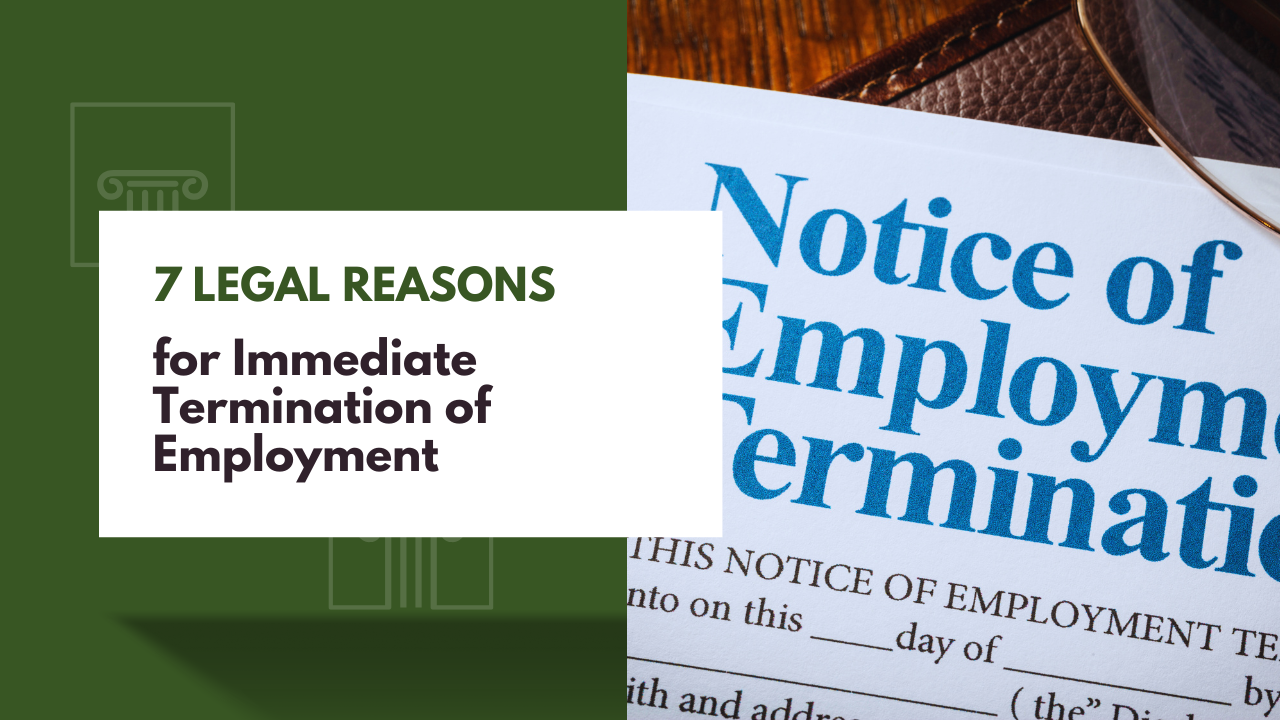
Saad Mirza
Hi! beautiful people. I`m an authtor of this blog. Read our post – stay with us

Saad Mirza
May 16, 2025
7 Legal Reasons for Immediate Termination of Employment: Know Your Rights as an Employer or Employee Before Acting Fast
Immediate termination-often called summary dismissal or termination for cause-is one of the most serious actions an employer can take in Canadian employment law. Unlike a standard termination, where an employee is given notice or pay in lieu of notice, immediate termination means the employment relationship ends on the spot, with no further compensation or notice.
While this is legal, the bar for justifying such a decision is set high: only the most serious forms of employee misconduct meet the threshold for summary dismissal.
What Is Immediate Termination?
Immediate termination means ending an employee’s job without any advance warning or severance pay. In Canadian law, this is only allowed when an employer has “just cause”-a legal standard requiring proof of serious misconduct that fundamentally breaks the trust at the heart of the employment relationship.
This is distinct from “termination with notice,” where an employee is let go for business reasons or minor issues and is entitled to notice or pay in lieu of notice.
I’ve seen both sides of this coin: employees shocked by a sudden dismissal, and employers grappling with whether a staff member’s actions truly justify such a step. In every case, the stakes are high-immediate termination can have lasting impacts on both parties.
Legal Grounds for Immediate Termination in Canada
Canadian courts have recognized several specific reasons that may justify immediate termination. Each case is unique, but these 7 are the most common legal grounds:
Reason #1. Dishonesty or Fraud
Trust is the foundation of any employment relationship. If an employee is caught lying about qualifications, falsifying records, or otherwise engaging in deceit that undermines the employer’s trust, immediate termination may be justified.
Reason #2. Theft or Misappropriation of Company Property
Stealing from the workplace, whether it’s cash, inventory, or confidential information, is a clear breach of trust. Even a single incident of theft can be grounds for summary dismissal. We’ve represented clients on both sides of these disputes-sometimes the evidence is clear, but in other cases, misunderstandings about property or permissions have led to wrongful dismissal claims.
Reason #3. Workplace Violence or Harassment
Physical violence, threats, or severe harassment in the workplace are taken extremely seriously. Employers have a duty to maintain a safe environment for all staff. If an employee engages in violent or harassing behavior, immediate termination is often appropriate, provided the employer has conducted a fair investigation and gathered sufficient evidence.
Reason #4. Serious Insubordination
Refusing to follow lawful and reasonable instructions-especially after clear warnings-can justify summary dismissal. However, not every disagreement or minor act of defiance rises to this level. The courts look for a pattern of willful disobedience or a single act so serious it destroys the employment relationship.
For instance, an employee who repeatedly ignores safety protocols after being warned may be lawfully dismissed on the spot.
Reason #5. Breach of Confidentiality or Trust
Employees are often entrusted with sensitive information or responsibilities. Disclosing confidential data, competing with the employer, or abusing a position of trust can all justify immediate termination. We’ve helped clients navigate cases where an employee shared proprietary information with a competitor-an act that courts have found to be just cause for dismissal.
Reason #6. Criminal Conduct Related to Work
If an employee commits a crime connected to their job-such as fraud, assault, or embezzlement-this is almost always grounds for summary dismissal. The key is that the criminal conduct must relate to the employment or damage the employer’s interests or reputation.
Reason #7. Repeated Misconduct Despite Warnings
Sometimes, an employee’s behavior isn’t egregious enough for immediate dismissal on the first offense. However, if the employee repeatedly engages in misconduct-such as chronic lateness, absenteeism, or performance issues-despite clear warnings and opportunities to improve, the employer may be justified in ending the relationship without further notice.
Employee Protections and Employer Responsibilities
Employers must tread carefully when considering immediate termination. The law requires that employers gather solid evidence and follow a fair process, including documenting the misconduct, conducting investigations, and giving the employee a chance to respond. Failure to do so can expose the employer to wrongful dismissal claims, which can result in significant damages, as seen in some of Canada’s largest awards.
When Immediate Termination Is Not Justified
Not every mistake or policy violation warrants summary dismissal. Minor infractions, one-off errors, or misunderstandings-especially where the employer has not clearly communicated expectations or policies-typically do not meet the legal standard for immediate termination. In fact, we’ve helped clients successfully challenge dismissals where the employer overreacted to a single incident or failed to follow their own procedures.
What Employees Should Do If Terminated Immediately
If you’re suddenly dismissed for cause, don’t panic. Here are steps you should take:
• Seek legal advice right away. An employment lawyer can review your case and advise you on your rights.
• Ask your employer for a written explanation of the reasons for your termination.
• Review your employment contract and any workplace policies.
• If you believe the termination was unfair or not truly for cause, consider filing a wrongful dismissal claim.
We’ve seen employees recover significant compensation after being wrongfully dismissed, especially when the employer failed to meet the strict legal requirements for immediate termination.
Immediate termination is a powerful tool, but it comes with strict legal obligations and risks. Employers must be certain that just cause exists and that they have followed a fair, documented process. Employees should know that they have rights and options if they are dismissed without proper justification.

Author: Saad Mirza
I’m Saad Mirza, the founder of Thrive Law, a employment law firm dedicated to helping employees across Ontario navigate challenging job terminations and workplace issues.

